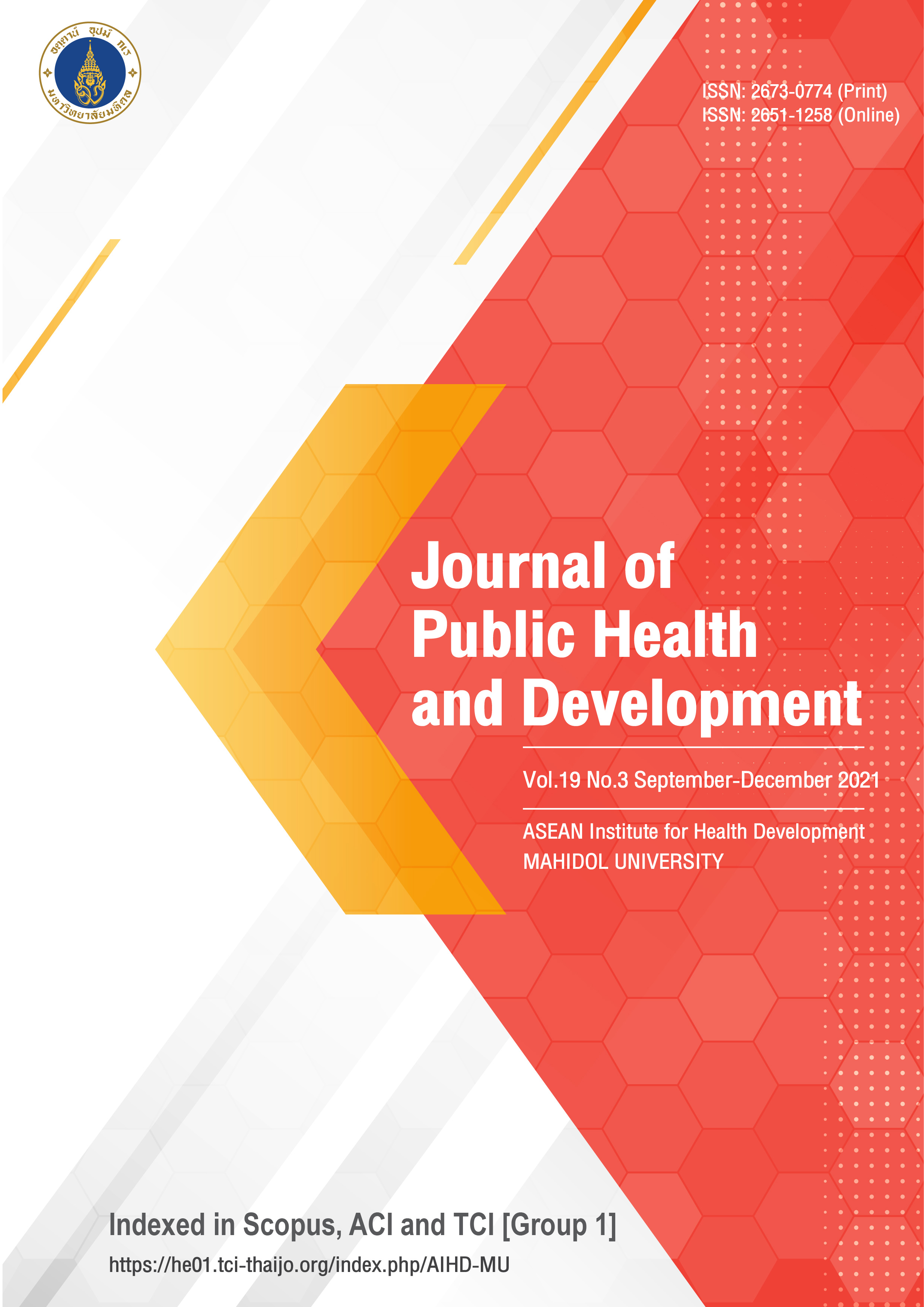Long-term effects of health shocks and insurance on rural households’ consumption and wealth in Vietnam: evidence from panel data
Main Article Content
Abstract
Evidence of the impact of health coverage on households’ financial security in the event of health shocks in Vietnam has been limited by a focus on public insurance and short-term shock experience. Therefore, we examined the impact of public and private insurance coverage, interacted with health shock experience over multiple years, on the consumption and wealth of rural households. Drawing on a representative sample of 1,876 rural households from three provinces in Vietnam, we show that, in the absence of health coverage, health shocks have a positive effect on health expenditures while reducing non-health expenditures and wealth. Public health coverage decreases the probability to incur health expenditures in the event of longer-term health shocks. Among households incurring health expenditures, public health coverage reduces the amount of health expenditures incurred within three years after the onset of an illness. Private health insurance mitigates reductions in non-health expenditures and wealth which can occur more than one year after a health shock. Our findings suggested that Vietnam’s public health coverage program needs improvement in terms of expanding the benefit package and/or reducing the proportion of cost sharing to effectively protect rural households from both short-term and longer-term financial risks including a decrease in non-health consumption and wealth associated with health shocks. Private health insurance can be a safeguard from the longer-term financial risks of illness, for those with access to it.
Article Details

This work is licensed under a Creative Commons Attribution-NonCommercial-NoDerivatives 4.0 International License.
References
World Health Organization. Health Systems Financing: the Path to Universal Coverage [Internet]. 2010 [Cited 2019 January 16]. Available from: https://www.who.int/whr/ 2010/en/
United Nations. Transforming our world: The 2030 agenda for sustainable development [Internet[. 2015 [Cited 2019 January 17]. Available from: https://sustainabledevelopment.un.org/post2015/transformingourworld/publication
Alam K, Mahal A. Economic impacts of health shocks on households in low and middle income countries: a review of the literature. Globalization and health 2014; 10(1):1-8.
McIntyre D, Thiede M, Dahlgren G, Whitehead M. What are the economic consequences for households of illness and of paying for health care in low-and middle-income country contexts? Soc Sci Med. 2006; 62(4): 858-65.
Ekman B, Liem NT, Duc HA, Axelson H. Health insurance reform in Vietnam: a review of recent developments and future challenges. Health Policy and Planning 2008; 23(4):252-263.
Government of Vietnam. Decree 63: Issuing Health Insurance Regulation. Hanoi: Ministry of Health 2005. (In Vietnamese).
Van Minh H, Pocock NS, Chaiyakunapruk N, Chhorvann C, Duc HA, Hanvoravongchai P, Lim J, Lucero-Prisno DE, Ng N, Phaholyothin N, Phonvisay A, Soe KM, Sychareun V. Progress toward universal health coverage in ASEAN. Glob Health Action. 2014; 7(1): 25856.
Axelson H, Bales S, Minh PD, Ekman B, Gerdtham UG. Health financing for the poor produces promising short-term effects on utilization and out-of-pocket expenditure: evidence from Vietnam. Int. J Equity Health. 2009; 8(1): 20.
Nguyen CV. The impact of voluntary health insurance on health care utilization and out of pocket payments: New evidence for Vietnam. Health Econ. 2012; 21(8): 946-66.
Palmer MG. Inequalities in universal health coverage: evidence from Vietnam. World Dev. 2014; 64: 384-94.
Sepehri A, Sarma S, Oguzoglu U. Does the financial protection of health insurance vary across providers? Vietnam’s experience. Soc Sci Med. 2011; 73(4): 559-67.
Wagstaff A. Estimating health insurance impacts under unobserved heterogeneity: the case of Vietnam's health care fund for the poor. Health Econ. 2010; 19(2):189-208.
Wagstaff A, Cotlear D, Eozenou PH, Buisman LR. Measuring progress towards universal health coverage: with an application to 24 developing countries. Oxford Rev Econ Policy. 2016; 32(1): 147-89.
Wagstaff A. Health insurance for the poor: initial impacts of Vietnam's health care fund for the poor. World Bank Policy Research Working Paper 2007; 4134.
Mitra S, Palmer M, Mont D, Groce N. Can households cope with health shocks in Vietnam? Health Econ. 2016; 25(7):888-907.
Bales S. Impact of health shocks on household welfare in Vietnam—Estimates using fixed effects estimation. Institute of Health Policy & Management (HEFPA) Working Paper 2013; 18.
Drechsler D, Jutting J. Different countries, different needs: the role of private health insurance in developing countries. J Health Polit Policy Law. 2007; 32(3): 497-534.
Pauly MV, Zweifel P, Scheffler RM, Preker AS, Bassett M. Private health insurance in developing countries. Health Aff. 2006; 25(2): 369-79.
Sekhri N, Savedoff W. Private health insurance: implications for developing countries. Bull World Health Organ. 2005; 83(2): 127-34.
Health Insurance System Research Office. Thailand’s Universal Coverage Scheme: Achievements and challenges. An independent assessment of the first 10 years (2001-2010) (Nonthaburi) [Internet]. 2012 [Cited 2020 December 8]. Available from: https://tile.loc. gov/storage-services/service/gdc/ gdcovop/2013341727/2013341727.pdf
Hardeweg B, Klasen S, Waibel H. Establishing a Database for Vulnerability Assessment. In: Klasen S, Waibel H, editors. Vulnerability to poverty. Theory, measurement and determinants, with case studies from Thailand and Vietnam. Basingstoke, UK: Palgrave Macmillan 2013:50–79.
Wagstaff A. The economic consequences of health shocks: evidence from Vietnam. J Health Econ. 2007; 26: 82–100.
Word Health Organization. The Global Health Observatory [Internet]. [Cited 2020 December 8]. Available from: https://www.who.int/data/gho/data/countries/country-details/GHO/viet-nam?countryProfileId=4c75655d-5754-4ff2-96ad-77d3162d6a86
Word Health Organization. A health financing review of Viet Nam with a focus on social health insurance [Internet]. 2011 [Cited 2020 December 8]. Available from: https://www. who.int/health_financing/documents/oasis_f_11-vietnam.pdf
Wainwright F, Newman C. Income shocks and household risk-coping strategies: evidence from rural Vietnam. Institute for International Integration Studies Discussion paper 2011; 358.


